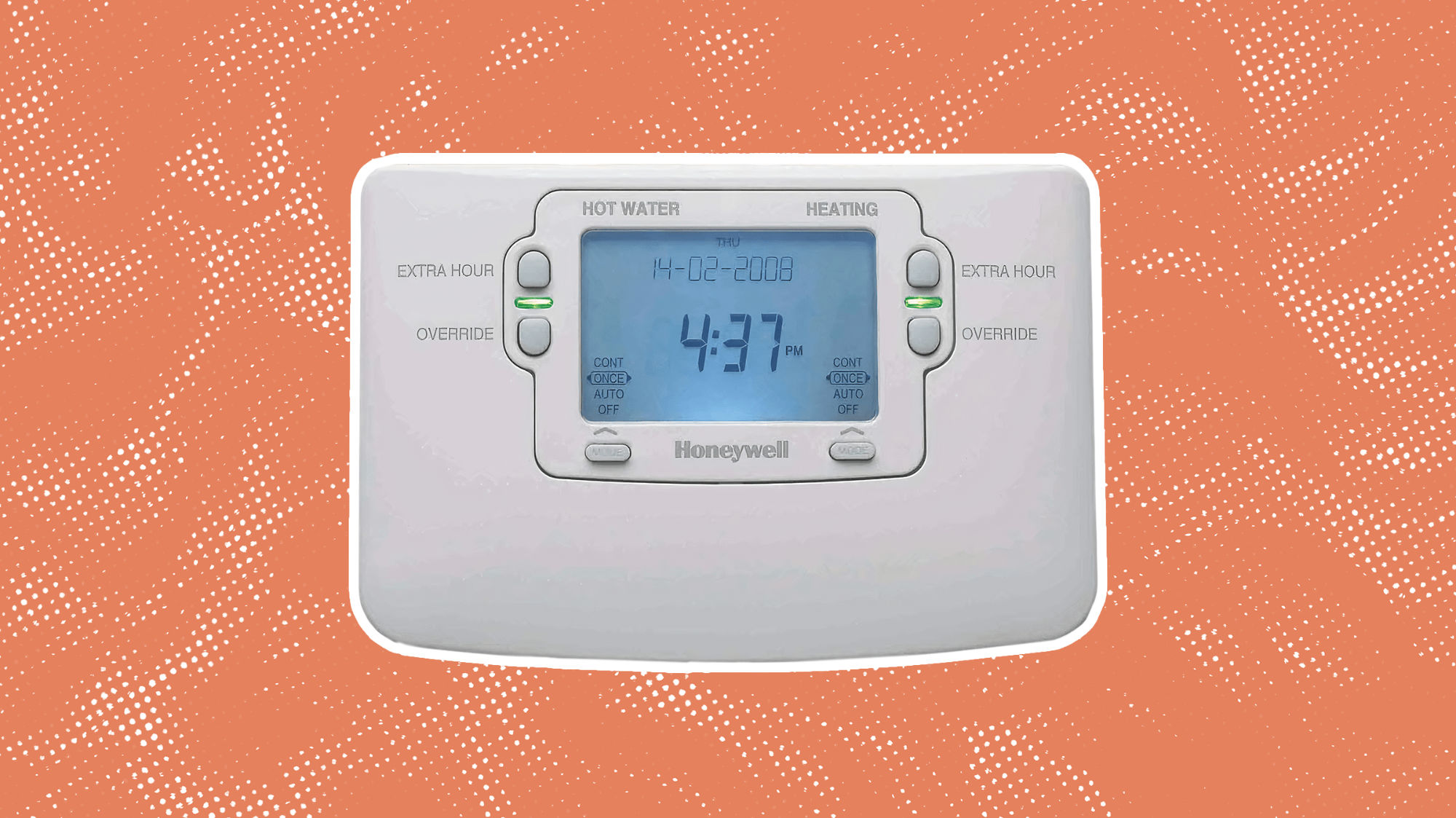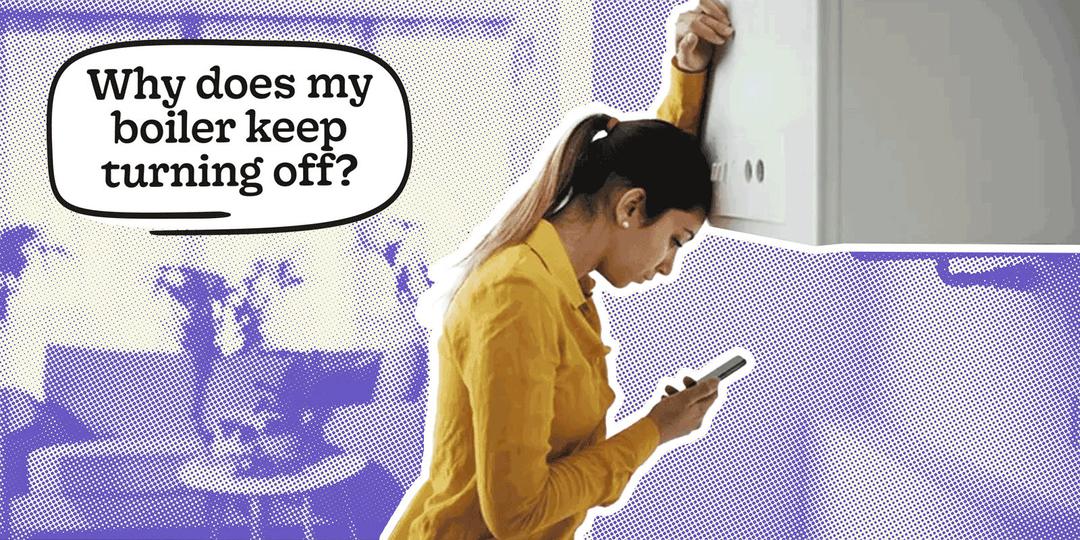Does your boiler keep turning off and you're wondering why? Let's find out and how you can fix it.
Boiler problems can be tricky to solve, not least because there are so many possible explanations for any given issue.
While finding the answer to a question like the one you’re here for can sometimes be relatively straightforward, other times it will take a bit of work to identify the exact issue.
Some of these problems can be fixed DIY while others must be dealt with by a Gas Safe heating engineer.
PS We fit new boilers with gas installation nationwide. Answer these questions, get your fixed price and you could get it installed as quick as tomorrow.
Why Does My Boiler Keep Turning Off?
Error Codes
Each boiler model comes with a range of error or fault codes. Their manual (whether on paper or online) should come with a list of these error codes.

As a result, when a code appears on your boiler, you can refer to the manufacturer’s manual to identify the problem.
Sometimes though boilers use a sequence of fault lights rather than a single fault code. So before moving on to the next section, checking for error codes or a sequence of fault lights may point you to the problem at hand.
Error codes are a quick and easy way to identify a fault with a boiler. Once we know the fault, it's easy to fix.
With that being said, you may not have a handy error code to identify a problem such as if the boiler is not functioning correctly such as if it is not even displaying an error code (this is, however, unlikely).
Regardless of whether you’re getting an error code/fault lights sequence or not, we’ll now look at the various potential causes for why your boiler is turning off, ranging from a heat exchanger issue to short-cycling to a frozen condensate.
Please note that the specific error code (if applicable) associated with the following issues will vary depending on the boiler model.
Boiler Issues
We’ll now take a closer look at a host of boiler problems. One or more of these issues will likely explain why your boiler keeps turning off.
[1] Pre-Heat
Firstly, if you have a combi boiler and find that it comes on occasionally, it is likely due to the pre-heat function. If this is the case, there’s no need to fret!
This is a common occurrence and not indicative of a boiler error. It simply means that the boiler is turning itself on to preheat water. This allows your boiler to be ready on demand when required.
[2] Valve Issue
An issue with the boiler’s temperature control valve (TCV) infers that the water temperature is no longer being regulated.
If the water temperature goes up too much, this can result in system leakage. This would in turn cause your boiler to turn itself off as a form of self-protection against overheating.
Another valve problem that may occur is when a closed valve stops the water from flowing through your boiler.
To check if this is the issue at hand, take a look at the valves beneath the boiler to see if they’re set to open. If they are then the problem may be with a valve situated within the boiler. If this is the case, it cannot be fixed DIY.
Instead, you’ll have to have a Gas Safe engineer evaluate the issue. Any problem that involves removing the boiler’s cover must be dealt with by a Gas Safe heating engineer.
Check out Gas Engineer Allen Hart explaining the most common boiler problems and how you can resolve them in the video below:
[3] Short-Cycling
If you’re finding that your boiler is shutting off and on again every several minutes, then short cycling is likely the problem.
Short-cycling is a problem for a boiler and bad for homeowners alike since it brings up energy bills.
To explain more about this issue...
Inside a combi boiler, its heat exchanger features a small water reservoir as a means for your boiler to provide you with hot water on demand.
The boiler's internal thermostat can detect when the water starts to cool down.
In response, it triggers the heat exchanger to reheat the water. It will turn off again as soon as the water heats back to the ideal temperature range.
The above process will repeat as soon as the water temperature drops again. The downside of this process repeating too frequently is that it uses up fuel (bringing you higher bills and a higher carbon footprint), while also overworking the heat exchanger.
The latter point is particularly a concern as it can reduce the life expectancy of the heat exchanger.
But that’s not all. If your heat exchanger ends up cracking, this can cost a fair few quid at around £400 to £600 in the standalone cost, before considering the cost of labour. Ultimately, you’ll want to avoid overworking your heat exchanger.
Let’s look a bit more at the cause of short cycling…
A boiler being oversized (i.e., its power output exceeds your needs) is the primary reason for short cycling. If this is the case, more steam will be produced than the boiler can condense. This will result in short-cycling and the boiler will lockout.
While having an oversized boiler made sense back in the day (since their efficiency levels stood at around 70%), it is no longer a suitable approach with modern boilers.
This is because today’s combi boilers offer energy efficiency levels of 90% or more. With the correctly sized boiler, it can prevent too much steam from being produced.
[4] Water Pressure
In general, a boiler should have a pressure level of around 1.5 bars. You can check the pressure level by looking at the pressure gauge at the front of your boiler.

Image of boiler pressure gauge / Heatable
If the pressure is too low or too high, the boiler will turn off. A fault code will subsequently appear.
Low pressure is generally the result of a system leak. As for leakage, this may occur beneath the boiler, on a radiator, or even in a pipe joint. If a leak is present, the boiler will turn itself off sooner or later.
If the leak is small, you may be able to fix it DIY, assuming you have the appropriate skills and knowledge. However, taking the right safety steps is essential.
For one, you’ll need to turn off your boiler but it’s also critical to isolate the power to your central heating system at the mains. Check carefully to ensure you turn off the correct switch(es). If in doubt, hire a professional.
Here’s how you can fix a small boiler leak and repressurise the system:
If you find water dripping from a pipe joint, dry the area surrounding the joint to ensure that you’ve correctly identified the source of leaking.
If you’re on the money, tighten the fitting a tad and check if it stops.
Repressurise your boiler. Check out our guide on repressurising (or topping up) your boiler for more details.
Once everything is good and safe, turn back on the power at the mains.
Turn back on your boiler and you’re good!
What other water pressure issues could occur?...
If a low pressure caused by a leak is not the problem at hand, it may be that there is trapped air inside the system.
Trapped air may stop water flowing through your central heating system, resulting in the boiler shutting down. If this is the case, safely bleed your radiators.
Alternatively, the issue may be that your boiler pressure is too high. In general, anything above 2.5 is too high although 1.5 is usually considered optimal.
Reasons for boiler pressure being too high include malfunctioning parts and there is too much water in the system.
For more information, read our high boiler pressure article. As you can see water pressure issues can differ greatly when it comes to boiler errors.
[5] Thermostat
A thermostat is designed to monitor the external temperature. It will turn on automatically if the temperature drops below a certain amount (as set by the user/homeowner).

Image of thermostat / Heatable
A thermostat error can result in the appliance failing to measure external temperatures correctly. The result can be that it will turn your boiler on and off unexpectedly.
Should you have an old thermostat, it might be worth upgrading to a wireless or/and smart thermostat. This can keep your fuel bills down with more accurate temperature control at your fingertips.
A faulty thermostat (unless presenting obvious errors) may be hard to identify as the cause behind a boiler turning off. This issue would be identified more quickly if you hire a heating engineer should you be in doubt as to the cause of your boiler shutting itself off.
[6] Heat Exchanger
A faulty or broken heat exchanger can be an expensive issue. That tallied with a boiler older than seven years (if true in your case) would make it more worth your money to simply pay for a boiler replacement.
Check out our ten favourite boiler brands.
You can also get a quote today from Heatable in only sixty seconds.
[7] Water Pump
Another potential cause of a boiler regularly shutting itself off is a faulty water pump.
If your water pump isn’t working correctly, then this will prevent water from moving around your central heating system correctly.
The result will be that your boiler will shut itself off as a way of protecting against overheating.
If there’s a problem with your water pump, it must be dealt with by a Gas Safe registered engineer.
[8] Fuel Supply
While one of the less likely causes, it’s also possible that interruptions to your boiler’s fuel supply are causing it to frequently shut off.
Here are a few ways to see if the fuel supply is the problem:
Take a look at various gas-supplied appliances (or those fuelled by whichever fuel/energy type is being supplied to your boiler) to see if they are working correctly.
If you’re using a prepaid meter, ensure you’ve enough credit (seems obvious but sometimes we overlook the obvious)
If there are unexplained interruptions to your fuel supply, get in touch with your energy supplier to inquire about the problems you’re facing (and if you’re an Everton fan, we don’t mean the 2021-22 season)
[9] Frozen Condensate
Last but not least, your boiler stops on a regular basis maybe the rest of a frozen condensate pipe.
Condensate pipes are small but critical waste pipes that safely carry acidic water away from your boiler, depositing such water into a drain.
However, these pipes can freeze if exposed to especially cold temperatures. When this happens, while the boiler will continue to dispose of the wastewater, this water will have nowhere to go as a result of the frozen water acting as a blockage.
The result: the wastewater backs up into the boiler. The boiler locks itself out in turn as a means of preventing damage.
You’ll be informed of the problem through either a collection of fault lights or a fault code, depending on what sort of boiler you have.
Another piece of evidence of a blocked condensate pipe is if you hear a gurgling noise coming from within the boiler.
If you have the right skills and knowledge and understand the necessary safety steps, you can thaw the condensate pipe with warm water before resetting the boiler.
Have a boiler from the brand Ideal Heating specifically with a frozen condensate pipe? We’ve got a guide just for you.
Recommended heating guides:
Boiler Keeps Turning Off: Verdict
As you can see there are many possible explanations as to why your boiler keeps shutting off.
However, with our shortlist of likely causes, you’ll hopefully be able to narrow it down to one specific issue or another. Of course, in rare cases, it’s possible that multiple issues are at hand.
Regardless of the case, if in doubt, hire a Gas Safe engineer to look at your central heating system. Again, certain issues require that you hire a Gas Safe engineer to take a more detailed look or/and fix the issue at hand.
Remember, whatever the issue is, it may be a sign of a wider issue, such as that your boiler is starting to deteriorate beyond economical repair (BER).
If this is the case, you should consider having a new boiler installed. This could save you money in the long term.
Get A New Boiler Quote Today
If you’re aiming to get the best deal on a new boiler, consider getting your boiler installation with us. Here’s why:
Gas Safe installation within 24 hours.
Thousands of satisfied customers with an average score of 4.9 on Trustpilot, surpassing the market leader.
Which? Trusted Trader: Heatable is proudly recognised as a Which? Trusted Trader.
Price match guarantee: We will match any like-for-like cheaper quote.
Flexible payment options, including interest-free finance*.
Up to a 12-year guarantee on selected boilers.
Fixed price guarantee: No hidden costs.
Save your quote and decide later.
Get an instant fixed price on a new boiler here.
To learn more about boilers, visit our advice section, check out our YouTube channel, or customer testimonials here.
Heat Happy.





